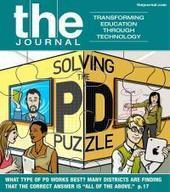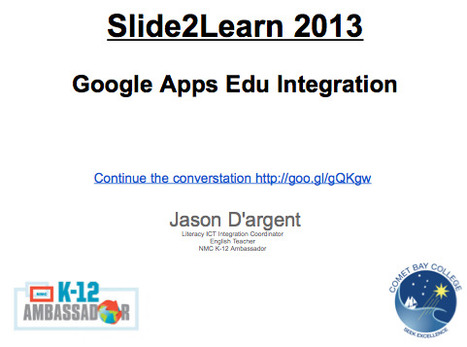Get Started for FREE
Sign up with Facebook Sign up with X
I don't have a Facebook or a X account
 Your new post is loading... Your new post is loading...
 Your new post is loading... Your new post is loading...

Peter Mellow's curator insight,
June 2, 2013 7:02 PM
As we all know, just giving students technology will not be as productive as giving them the tehcnology and guidence in the form of an educator, who knows the big picture.

Drora Arussy's comment,
April 24, 2013 11:14 AM
I see many postings from a few days ago updating things in the book

systerwoody's comment,
April 24, 2013 11:25 AM
I see the list of update on the right side. I was clicking on the left side menu. So I stand corrected AND I'll join the G+Peeragogy community. Thanks.

David Álvarez's curator insight,
April 24, 2013 12:01 PM
Libro sobre técnicas de automotivación para el aprendizaje |

dianataylor's comment,
July 19, 2013 1:54 AM
"A constructivist approach to learning proposes that
students make sense of new information by using and building upon prior knowledge. However, learners often do not have adequate cognitive structures for accommodating new concepts. In these cases, designing activities that prepare students for future learning can be an efficient strategy, and the PFL framework is based on this assumption [5]. In other words, this approach encourages students to generate their own ideas about a class of phenomena. Previous work [5], [34], [35] suggests that this preparation sets the stage for future learning; once students develop their own personalized theory about a phenomenon, they can contrast their own thinking with that of others, including experts." 
John Clayton's curator insight,
July 7, 2013 2:42 PM
Millennials, the generation of people born between 1981 and 1999 during the rice of ICTs. They will be looking for mobile learning, gamification, and video-based learning.

Paola Houston-Davalos's curator insight,
June 26, 2013 9:18 PM
Students need to know how important it is to write meaningful assessments on articles and topics they choose so that their peers can in turn make meaningful comments. Then they need to comment on their classmates' assessments. This way students engage in an online community that keeps everyone powerfully engaged. 
Paola Houston-Davalos's curator insight,
June 26, 2013 10:02 PM
Students need to know how important it is to write meaningful assessments on articles and topics they choose so that their peers can in turn make meaningful comments. Then they need to comment on their classmates' assessments. This way students engage in an online community that keeps everyone powerfully engaged.

Seth Dixon's curator insight,
April 25, 2013 2:33 PM
I've greatly enjoyed working with Allison Hunt for the last 8 years and as always, she has a great perspective on the helping students become empowered.
Arthur White's curator insight,
June 6, 2013 9:25 PM
Useful stuff for transforming teaching and learning |



































The flipside of the flipped classroom is that it challenges teachers to reconsider what is done and how time is spent in the classroom - that is, what students do to learn and what teachers do to facilitate and support learning, in the space left by the removal of 'teacher-talk'. For some, this is a paradigm shift that requires letting go of the attachment to content, in favour of a focus on the learning process ...